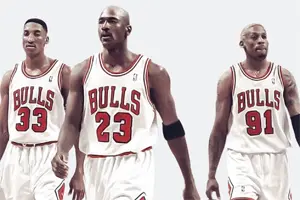The Last Dance is too "Jordanized For Your Protection"
-

Sunday's third episode of ESPN's 10-part documentary on Michael Jordan and the 1997-98 Chicago Bulls focused on Dennis Rodman, one of the most interesting players in NBA history. It would seem impossible to make Rodman's story rote or dull, says David Roth, but The Last Dance manages to do just that by focusing on Rodman from Jordan's perspective. "It makes sense, both as a business proposition and a storytelling one, to make Michael Jordan the center of The Last Dance: It’s his show, and not just because the never-before-seen footage that’s the series’s ostensible hook was kept locked up for decades at Jordan’s request," says Roth. "But while it’s understandable that (director Jason) Hehir would make Jordan as central to the story as he was to his great Bulls teams, there’s something warped and stunting about telling the stories of that team’s other stars exclusively through how they related to Jordan himself." Roth adds: "The problem is not just that Jordan isn’t a reliable narrator—he’s a pathologically competitive egomaniac, if you’re just joining us—but that he isn’t an especially insightful or curious one. Instead of making Jordan’s version of the story part of a broader whole, Hehir seems dedicated to reverse-engineering a broader and universally agreed-upon truth onto Jordan’s version of things...This dedication to presenting every aspect of the story in a Jordanized For Your Protection way is doubly frustrating because this episode, like previous installments, quickens into something galvanic and fun when it goes from showing to telling. The insistence on hewing to Jordan’s stilted and salty perspective doesn’t add much either to what is already known about Jordan’s career—he was forever finding or inventing haters to smash and was one of the great grudge-cultivators in sports history—or to the story The Last Dance sets out to tell."
ALSO:
- The Last Dance's is flawed for having its history written solely by Michael Jordan himself: "All stories are framed by Jordan’s commentary, and anytime anyone says anything that might upset Jordan, we cut to him growling or rolling his eyes at them," says Will Leitch. "Every talking head, a grouping that includes countless Hall of Famers and NBA immortals, seems to exist in the world of the documentary solely to boost Jordan’s legend. Jordan’s word is taken as absolute scripture, whether it’s about his infamous gambling problem, some of his more notorious off-court exploits or his long-debated reluctance to speak about any world issue that wasn’t explicitly about basketball. To Jordan, the entire world is distraction from his reason for living — winning championships and destroying all who stand in his way, and even many who don’t — and (director Jason) Hehir and company never push harder than that. It’s a telling sign that the film spends almost as much time on an (amusing) Jerry Seinfeld visit to the Bulls locker room as it does on Jordan’s refusal to endorse Harvey Gantt over Jesse Helms in the 1990 North Carolina Senate race."
- Carmen Electra on watching ex Dennis Rodman on The Last Dance: "Seeing Dennis back on the court brought tears to my eyes"
- With the actual NBA season on hold, The Last Dance is the league’s most compelling document of the times
- Michael Jordan is now the subject of a new meme thanks to his bemused expression on The Last Dance
- Episodes 3 and 4 of The Last Dance averaged 5.9 million viewers
- How ESPN made that retro SportsCenter-themed Jordan State Farm ad
TOPICS: The Last Dance, ESPN, Carmen Electra, Dennis Rodman, Jason Hehir, Michael Jordan, Documentaries, NBA, Ratings
More The Last Dance on Primetimer:
